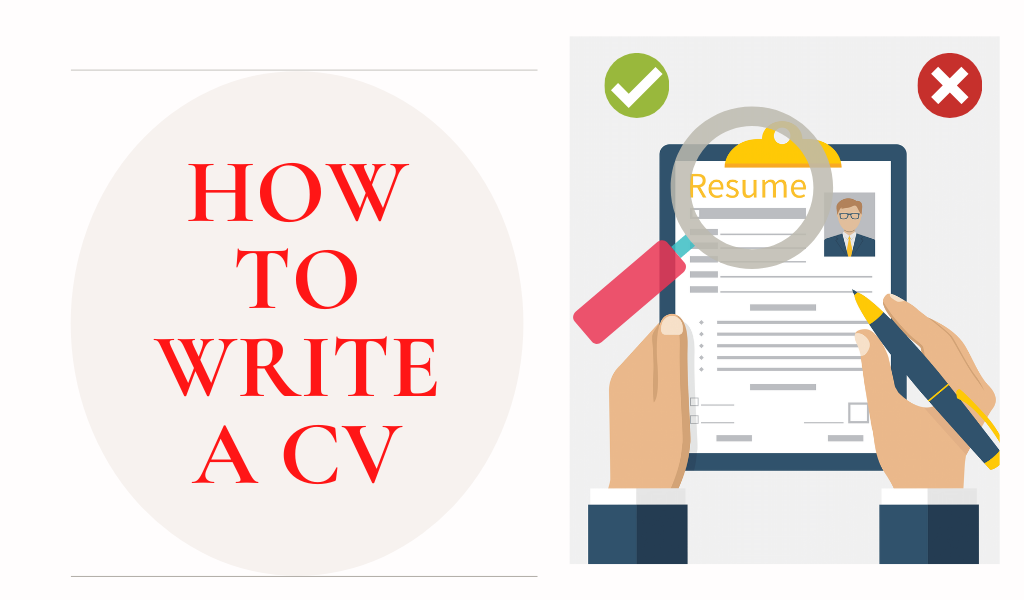People usually say “Preparation is a key to a successful interview” and CV is one of the most important things in process of preparing for an interview. For this reason, we’ve put together a guide of what to include in your generic CV. In case you are unsure how to make a standard CV, you can refer to free simple CV templates for your first job.
What to include in a basic CV?
- Contact details
On the top of your CV, you want to include your full name, email, home address and contact number. This is so employers can get in touch with the next steps of your application, so it’s pretty vital to include, and make as visual as possible! Put these in bold or another colour to make them stand out.
You also want to include a link to your LinkedIn profile – here’re our top tips to write a LinkedIn profile.
- List general and transferable skills
As your career progresses and you become more specliased in a field, you can begin tailoring your skills to an industry, but as a graduate starting out your career, you want to include general and transferable skills suited to a range of roles. You want to list ‘soft skills’ rather than ‘technical skills’ (do list these if you have them!), soft skills combine social, communication and people skills.
Listing these skills shows employers you have the ability to work effectively in a team and independently, essential qualities for all roles.
Some of the best skills to add to CV:
- Teamwork
- Excellent communicator
- Problem-solving
- Strong work ethic
- Flexibility
- Adaptability
- Highly motivated
- Time management
- Critical thinking
You want to bullet point these soft skills in a general skills section, this is a great way to quickly show an employer the wide range of skills you have. Along with soft skills, you want to include any programmes/software you know how to use (e.g Excel, Adobe Creative), more generic skills (e.g First Aid trained), and any language you can speak (e.g Conversational French).
Related to: The Top 25 Words to Describe Yourself on Your CV
How To Approach An Interview If You Are Not Fluent In English – Tips For Fresh Graduates
- Personal profile
Your personal profile is your first chance to sell yourself to an employer. Here you should have a couple of sentences about yourself and what you can bring to a role. You want to list a few soft skill examples, your previous work experience and what you’re now looking for.
We’ve put together a basic personal profile template, so just slot in your own information!
Basic personal profile template:
An organised and highly motivated individual [soft skill examples] with a First-Class English Literature degree from The University of York [degree/result]. Concurrently, with experience in multiple retail and wholesale environments [previous work experience] and now looking to thrive and develop in a fast-paced and challenging setting. [type of environment looking for].
- List a range of experience
If you’ve just left university, and are applying for your first graduate roles, this might mean you don’t have a lot of previous work experience, and experience in a specific sector. Instead, you want to list any part-time jobs, volunteering or roles you’ve had in any societies or sports clubs.
Whilst you may think listing a part-time job you’ve had at Sainsburys for example isn’t going to sound very impressive, you were most likely gaining valuable skills employers are looking for, such as communication, teamwork and customer services, so don’t rule out previous roles. It’s important to include all the skills you developed in a role, no matter the role.
- Education history
Your education should be listed in order, with your most recent qualifications first. Follow this format when listing your results:
What (e.g 1st Class Degree) Where (e.g University of York) When (2016-2019).
With GCSE’s don’t list each subject but include the number of each grade you achieved e.g 1B, 7A’s, 2A*s.
- Include interests and hobbies
Including your interests and hobbies is a great way to inject some personality into your graduate CV, and helps make your CV more memorable.
Let an employer know about any of your passions and hobbies, whether it’s street dance, cooking, or you love to travel. Make sure to keep them appropriate and highlight any if they’re relevant to the role you’re applying for.
You also want to list any impressive achievements your hobbies have led you to, e.g. whilst travelling you climbed Machu Picchu, or you raised X amount of money through a marathon you ran. This is a great way to impress employers – important if you don’t yet have a lot of previous work experience.
- References
If an employer is impressed by you, they may wish to speak to your references. At the bottom of your CV list at least two referees along with their contact details, this can be anyone you’ve worked with in the past who was in a managerial or senior position. If you haven’t had previous jobs, list anyone you’ve volunteered with, or it can even be a university lecturer. If you don’t want to list these, include a sentence such as ‘references available on request’.
Basic CV Design tips and templates
With a basic graduate and student CV, you don’t need to spend ages on the design, but it is useful to include a few layout features, to inject a bit of life into your CV – here’s a few tips on how to design your CV simply.
- With a generic CV, keeping it simple is best. Use features such as bullet points and dashes to begin new sections, this will make your CV look clean and easy to read.
- Use colour effectively. Putting your name or heading sections in a different colour is a nice touch that’s not too distracting.
Want to start applying for graduate roles right away and don’t want to fuss with the design of your CV?
Download our free simple CV templates!
Are you graduates or students? Then read more other interesting tips to apply your first jobs HERE
Source https://www.giveagradago.com/news/2020/01/basic-cv-templates-free-download-examples/468






Recent Comments